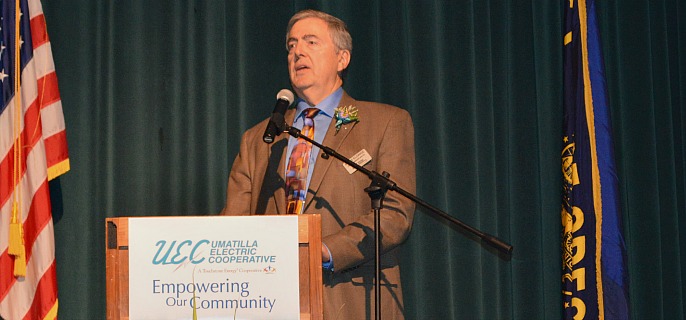
NEONOW FILE PHOTO
The higher energy costs predicted several years ago haven’t materialized, but could be coming in the near future.
That was the message from Umatilla Electric Cooperative General Manager Steve Eldrige during UEC’s 77th Annual Meeting Saturday night at the Hermiston Conference Center.
Eldrige said there are three reasons power rates haven’t gone up as many expected. One is that the federal government has always built ahead of demand. For example, the federal dams were built prior to the need for their power and were taxpayer supported. These days, wind developers, too, are supported by subsidies spread out over about 150 million taxpayers.
Secondly, no one foresaw the great recession of 2007-08.
“We are still selling less energy across the state – and maybe across the country – than we did seven years ago,” Eldrige told UEC members at Saturday’s meeting. “So the pressure for additional generation hasn’t come as quickly as we thought it would a few years ago.”
And then there’s fracking – hydraulically extracting natural gas from shale rock layers deep within the earth.
“Fracking has brought a bonanza of natural gas and oil,” Eldrige said. “In fact, it may make us energy independent. It’s held down the price of energy which sets the electric market price. So, instead of it being 8 cents, it’s 3 ½ cents – huge benefit to us.”
But energy costs will eventually go up and Eldrige says it will likely be political reasons rather than the cost of concrete, steel, equipment, fuel or debt service that drives up the price.
“Right now, climate change advocates within the Environmental Protection Agency are proposing that a surcharge of 35 cents to 50 cents per kilowatt hour be added to any coal generation,” he said. “They’re convinced that not only is there a global warming cost that is not being paid for, but that there’s a health cost”. Coal currently costs about 6 cents per kilowatt hour.
“If you had to pay 56 cents, who could afford that?” he asked.
Finally, Eldrige said natural gas may be cheap now, but likely won’t stay that way.
“It’s going to be the fuel choice for new generation,” he said. There are groups advocating for the exporting of natural gas and, said Eldrige, if that happens, it will go to a global price and it won’t be cheap like it is today in the United States.
“And there are proposals to just use it for everything you can think of – convert cars and trucks to being fueled by natural gas,” he said. “That will put pressure on supply.” And, he added, environmentalists are calling for a tax on it because it’s still a fossil fuel and they say it plays a part in climate change.
“I don’t think any of those proposals will keep energy costs low, which we have enjoyed for many, many years in the United States.”
Eldrige’s advice to energy consumers is simple – save your energy.
“Don’t use any more than you have to,” he said. He advised UEC members to take advantage of UEC’s new Smart Hub, which allows members to monitor their energy usage and get information about their electrical bill.
“I just urge you to think about the way you use energy because it’s going to go up,” he said.
Eldrige also said UEC spent a lot of time last year working to change Oregon’s Renewable Portfolio Standard law which mandated that all electric utilities in the state have non-hydro renewable energy in their portfolio. Utilities that sell 3 percent of more of the energy sold in the state have to ultimately have 25 percent of their supply come from non-hydro renewables – primarily wind and solar. Eighty percent of UEC’s energy comes from hydro power, which under the RPS law, is not considered renewable.
Eldrige said that by 2016, UEC is expected to become a seller of more than 3 percent of the total energy sales in Oregon. That would mean, he said, that over the next 25 years, the law would have extracted more than $75 million in additional costs from UEC members.
“So what we thought we’d do is start a ballot measure that would make all hydro power renewable under the Oregon RPS and if successful, we would have met the requirement of the RPS law,” Eldrige said. “Gov. Kitzhaber hated that idea and so did most environmental groups.”
State Rep. Greg Smith (R-Heppner) stepped into the picture and proposed to the governor that the two co-chair a task force to come up with a compromise.
“I’m happy to report that we did reach a compromise that will reduce the $75 million in additional costs by more than $30 million over the next 25 years,” Eldrige said.
The UEC general manager said that effort was part of an overall successful year for Umatilla Electric.
“We spent a lot of time watching out for you and your interests and I think we were largely successful and we believe that 2014 will be another year of stability for members of Umatilla Electric,” he said. “It is our honor to serve you.”
More Stories from Northeast Oregon Now:
Meet the Champion of Overcoming Adversity
Easter Eggs Disappear Among Swarming Children








